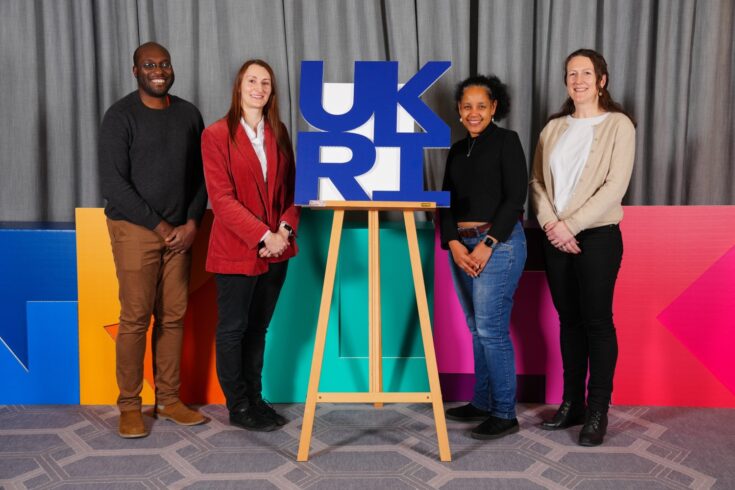Science and Technology Facilities Council
|
|
UKRI announces Future Leaders Fellowships Impact Awards winners
- Also published by:
- Economic and Social Research Council
Fellows have demonstrated significant wide-reaching, positive impact through their leadership, research, innovation and engagement.

Winners of the FLF Impact Awards. Left to right: John Baison, Leonie Tanczer, Yoselin Benitez-Alfonso and Aoife Doyle. Credit: UK Research and Innovation
The Future Leaders Fellowships (FLF) inaugural awards were celebrated at FLF’s annual conference in Manchester today, shining a spotlight on the next wave of world-class leaders in academia and business.
These future leaders are tackling ambitious programmes or multidisciplinary questions, and new or emerging research and innovation areas and partnerships.
The first FLF Impact Awards received over 60 entries across four categories:
- advancing culture
- leadership
- public engagement
- research and innovation
Each winner was awarded up to £10,000 to spend on further advancement or wider dissemination of their impact, learning or development opportunities for themselves or their teams.
Reward future fellows making strides in important areas
UK Research and Innovation (UKRI) FLF Director, Dr Stephen Meader recently said:
It was fantastic to see so many real-world impacts from the work that our Fellows are doing, and I know the judging panel found it very hard to pick winners from so many outstanding entries.
These awards also provide us with a way to reward those FLFs making strides in important areas such as positive leadership and the advancement of cultural change, which don’t always receive the attention and accolades they deserve.
Further information
UKRI FLF Impact Award winners
Advancing Culture Award
Winner: Yoselin Benitez-Alfonso and John Baison (University of Leeds and RAGT Seeds LTD)
The Advancing Culture Award is for fellows that have achieved cultural change in their organisation.
Yoselin Benitez-Alfonso and John Baison wins the Advancing Culture Award. They co-founded the ‘Black in Plant Science’ (BiPS) initiative, to create resources and opportunities to nurture, connect and retain UK-based Black plant scientists.
Through the success of their network to date, over £75,000 in additional funding has been secured to support the continued development and delivery of the network.
Highly commended entries in this category were:
- Jenevieve Mannell, Katie McQuaid and Emily Bridger (University College London, University of Leeds and University of Exeter) for their work on supporting the mental health and wellbeing of researchers
- Marc Reid (University of Strathclyde) for fostering openness and community around the culture of mental health awareness
Leadership Award
Winner: Leonie Tanczer (University College London)
Leonie Tanczer wins the Leadership Award for adopting a team-first mentality to her project setup, research and engagement strategy.
She has created a forum for peer support, delivering regular training to build her team’s wider skillset, underpinning this with exposure to high-profile opportunities to embed their learning. This has delivered national and international impact.
Her work has influenced development approaches in other teams and created opportunities for students outside her group in other universities.
Highly commended entries in this category were:
- Oliver Hauser (University of Exeter) for developing an inclusive research culture
- Kurtis Irwin (Catagen) for fostering a culture of continuous improvement
Research and Innovation Award
Winner: Izabela Jurewicz (Advanced Material Development Ltd)
Izabela Jurewicz wins the Research and Innovation Impact Award. Her innovation brings improvements to vaccine safety and a reduction of vaccine wastage by offering a novel inspired by nature vaccine vial monitors. These are small stickers that adhere to vaccine vials that can change colour as the vaccine is exposed to excessive heat.
This innovation will enable the global community to save millions of pounds. It will also take the vaccine beyond the cold chain, which is too difficult to access in some regions of the world.
Having presented the prototype at pharma shows and exhibitions, the innovation has attracted significant interest with Izabela now driving the scale-up activities to increase the maturity of the technology.
Highly commended entries in this category were:
- Chris Balance (University of Oxford) for developing the highest performance commercial quantum computer chips
- Siddartha Khastgir (WMG, University of Warwick) for enhancing the safety of automated transportation
- Anna Tarrant (University of Lincoln) for supporting young fathers
Public Engagement Award
Winner: Aoife Doyle (London School of Hygiene and Tropical Medicine)
Aoife Doyle wins the Public Engagement Award. Aoife and her team’s research on young people’s health in Zimbabwe has integrated youth and community engagement into every research stage.
Her FLF project, Y-Check, is guided by a youth advisory panel and purposefully embeds research conducted by mentored youth researchers.
The Y-Check intervention was co-designed with adolescents, parents, teachers, and healthcare workers. She implemented a crowdsourcing contest and hackathon with young people to design the intervention brand which engaged young people with Y-Check.
Notably, she works closely with local partner organisations, Biomedical Research and Training Institute and Organization for Public Health Intervention and Development, to:
- document good youth engagement practice
- support public engagement skill building among young people and researchers
Highly commended entries in this category were:
- Luisa Enria (London School of Hygiene and Tropical Medicine) for communities on the frontlines of epidemic response
- Sarah Marie Hall (The University of Manchester) for austerity and altered life-courses
Original article link: https://www.ukri.org/news/ukri-announces-future-leaders-fellowships-impact-awards-winners/


